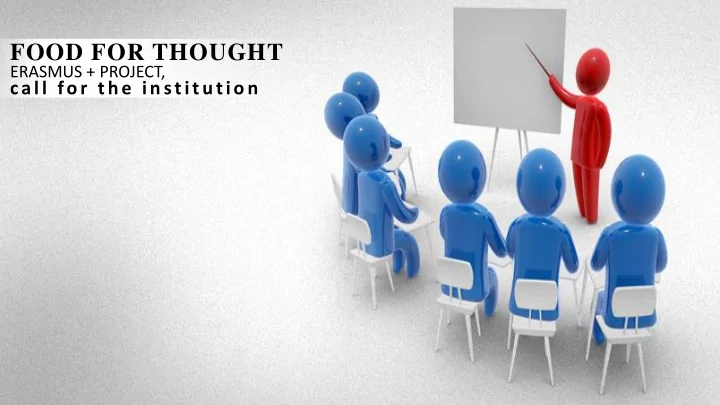

FOOD FOR THOUGHT ERASMUS + PROJECT, call fo r th e in stitution
KA 201 - Strategic Partnerships for school education Cooperation for innovation and the exchange of good practices PROJECT REFERENCE No: 2018-1-PL01-KA201-050604
Szkola Podstawowa nr 1 im. K.I. Galczynskiego w Grajewie, Grajewo, Poland.
Scoala Gimnaziala Magura, Buzau, Romania.
Osnovna skola "Matija Gubec" Cernik, Croatia.
Gymnasio Feron, ΦΕΡΕΣ. ΕΒΡΟΣ , Greece.
Convitto Nazionale Rinaldo Corso, Correggio, Italy.
VDU "Atzalynas" progymnasium, Kaunas, Lithuania.
Description of the Project. Our project is called "Food for Thought - A Cultural Recipe of European Traditions and Customs". It is designed for two years' implementation. It has six European partner schools and its objectives are to help students become better learners and know more about European traditions and culinary customs. The idea appeared in the context of globalization, from the desire to show the beauty, importance and richness of every peculiar people, in terms of keeping the heritage safe and sound for the generations to come. Accordingly, we want to show our products to the communities so that everybody should learn this valuable lesson of respect and pride for the cultural assets that we are still in possession of.
Description of the Project. We intend to involve around 1000 people in the development of our project. They will be mainly teachers and students, but not only. All the students will have the chance to get involved in this project, regardless of social level or intellectual capacity, or anything else. The participation depends on their own will entirely. At local levels, we are going to involve different other institutions able to help us reach our objectives. Also,we intend to make our results public, so that other schools benefit from the new knowledge. As far as the activities are concerned, we tried to make them be diverse, pleasant and instructive, and in line with our learning goals. By their specific, they will solicit students in a lot of areas, such as communication in English, online, using different programs, doing workshops, research, dancing and singing or applying Chemistry knowledge to food choosing. Group activities, school performances and laboratory work will be expressions of our PBL process. The new information will be used either in regular lessons or as optional material.
Description of the Project. The results will be the project mirror, focussed on food and traditions throughout Europe. Therefore, there will be two e-books, a project calendar and a magazine. Also, there will be a lot of workshops, performances and school contests. They will be important in ensuring a proper impact of the project, the cultural luggage of our participants getting bigger and more diversified. On a longer term, we hope to be effective in promoting these values further on, by ourselves within different occasions and through our students and their friends. The final scope is that we build future reliable, educate citizens of the multicultural society of tomorrow.
Mobility. Learning/Teaching/Training Activities C1 / Poland. Participating Organisations: Scoala Gimnaziala Magura, Gymnasio Feron. C2 / Italy. Participating Organisations: Szkola Podstawowa nr 1 im. K.I. Galczynskiego w Grajewie, Scoala Gimnaziala Magura. C3 / Lithuania. Participating Organisations: Convitto Nazionale Rinaldo Corso, Osnovna skola "Matija Gubec" Cernik. C4 / Croatia. Participating Organisations: Convitto Nazionale Rinaldo Corso, VDU "Atzalynas" progymnasium. C5 / Romania. Participating Organisations: Gymnasio Feron, VDU "Atzalynas" progymnasium. C6 / Greece. Participating Organisations: Szkola Podstawowa nr 1 im. K.I. Galczynskiego w Grajewie, Osnovna skola "Matija Gubec" Cernik. Poland, Croatia and Greece will host three Transnational project meetings as follows: Poland - November 2018, Croatia - October 2019, Greece - May 2020. There will always be a coordinator and a teacher/teachers connected to the project (with s particular subject).
BUDGET SUMMARY.
Uspjeha! Sukces!
Recommend
More recommend